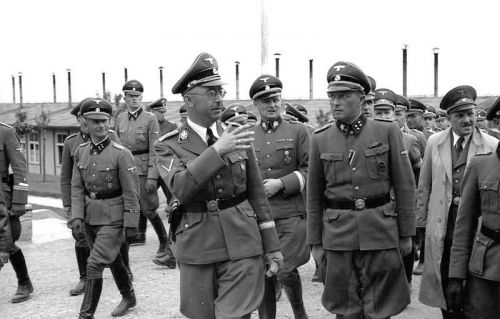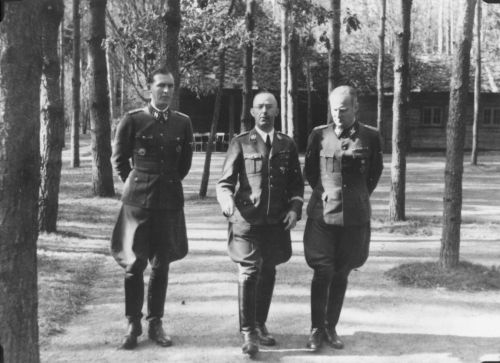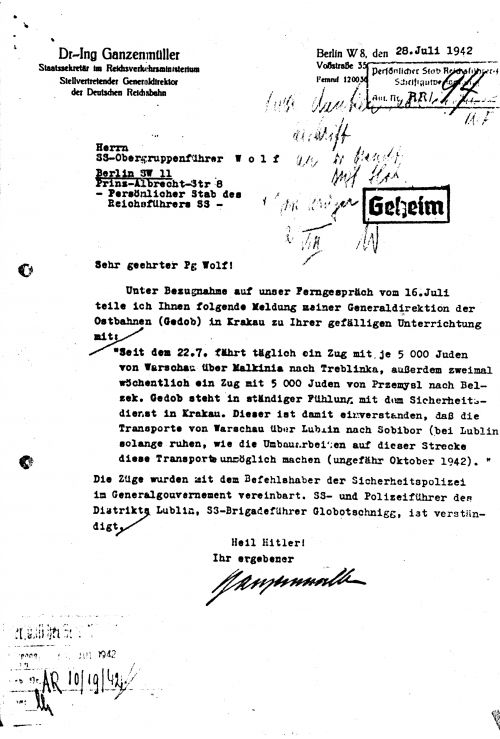Karl Wolff

Karl Wolff - behind Himmler visits Mauthausen Concentration Camp (Bundesarchiv)
Karl Wolff was born on May 13, 1900 in Darmstadt, the son of a wealthy district court magistrate. He saw active service during the First World War, rising to the rank of Lieutenant in the Guards and receiving the Iron Cross - First and Second Class. From December 1918 to May 1920, he was a Lieutenant in the Hessian Freikorps. For the next five years he worked as a commercial clerk in various firms and from 1925 to 1933, was the proprietor of an advertising enterprise in Munich.
He joined the Nazi Party during 1931, and by March 1933, was already an SS leader. From March to June 1933, Karl Wolff served as an Adjutant to the right wing nationalist Governor of Bavaria, General Ritter von Epp, and in July of the same year became Heinrich Himmler's personal adjutant. A member of the Reichstag for the district of Hessen from 1936, Wolff rose rapidly in the ranks of the SS. He was promoted to the rank of SS Lieutenant - Colonel on January 30, 1934, and was promoted again on July 4, 1934, to the rank of SS Major-General and on November 9, 1935, to SS -Lieutenant-General on January 30, 1937.
Karl Wolff received the Golden Party Badge of the Nazi Party on January 30, 1939, and was made a Lieutenant-General of the Waffen-SS, on May 3, 1940. He was virtually Himmler's deputy following the nomination of Reinhard Heydrich as 'Protector of Bohemia,' and Karl Wolff also served as the SS Chief Liaison officer with the Fuhrer.

Richard- Schulze-Kossens, Heinrich Himmler, Karl Wolff - Wolf's Lair Rastenburg (USHMM)
During 1942, Wolff was promoted to the rank of SS-Obergruppenfuhrer and Colonel-General of the Waffen-SS. Wolff was dismissed by Himmler in 1943, as his personal adjutant, because he insisted on divorcing his wife, and against Himmler's objections, Wolff appealed directly to Adolf Hitler. In September 1943, Wolff was appointed to the post of German Military Governor of northern Italy and Plenipotentiary to Benito Mussolini during the last two years of the war.
Wolff was convinced by the end of February 1945, that the war was lost, he established contact through Italian and Swiss intermediaries with Allen Dulles, the representative of the United States of America Office of Strategic Services. His negotiations behind Hitler's back in Zurich led to the early surrender of German forces in Italy. For this service the elegant, smooth SS General was not tried at Nuremburg, appearing instead as a willing prosecution witness in full military uniform before the court.
Karl Wolff was sentenced to four years' hard labour by a German court in 1946, he spent only one week in prison. Upon release he subsequently became a highly successful advertising agent in Cologne, later building an elegant lakeside villa on the Starnberger See from his earnings. He published his memoirs during the Adolf Eichmann trial during 1961, and this drew the public's attention and the Bavarian Justice Minister. He probed Wolff's wartime activities, as a key figure in Himmler's entourage and in the building up of the SS, in the Third Reich.
The amiable, aristocratic- looking Karl Wolff was arrested on January 18, 1962, and charged with complicity in the mass murder of Jews. He was accused of sending at least 300,000 Jews to the Treblinka death camp. Karl Wolff was ordered to look into transport difficulties. Wolff contacted Dr. Theodor Ganzenmuller, the Secretary of State of the Ministry of Transport, by telephone. On July 28, 1942, Dr. Ganzenmuller wrote to Karl Wolff on July 28, 1942, explaining that since July 22, a train load of 5,000 Jews has departed daily from Warsaw via Malkinia to Treblinka, and in addition a trainload of 5,000 Jews has left Przemysl twice a week for Belzec. This letter is shown below:

Karl Wolff replied on August 13, 1942, 'Hearty thanks......... With great joy I learned from your announcement that, for the past fourteen days, a train has gone daily to Treblinka with 5,000 'members of the chosen people'
Wolff was also charged of complicity in the shooting of partisans and Jews behind the front near Minsk, where he had been present as Himmler's Chief of Staff, and it was claimed that he was a willing participant in the 'Final Solution' in an advisory and consultative capacity. The assizes of the Munich County Court did not accept Karl Wolff's denials of any knowledge of the death camps and sentenced him on September 30, 1964, to fifteen year's penal servitude and loss of civil rights for ten years. The sentence was softened in view of his 'otherwise blameless life,' and contribution to shortening the war, and in 1971, he was released. Karl Wolff died in Rosenheim on July 15, 1984.
Sources
R.S. Wistrich, Who’s Who in Nazi Germany, published by Routledge, London and New York 1995
Y. Arad, Belzec, Sobibor Treblinka, Indiana University Press, Bloomington and Indianapolis 1987
Photographs – Bundesarchiv, USHMM
Document: Holocaust Historical Society
© Holocaust Historical Society, 5 July 2020

